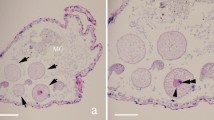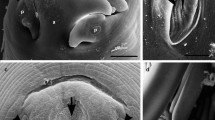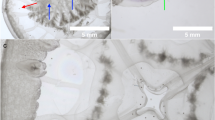Abstract
THE possibility of British species of Lymnæa, other than L. truncatula, acting as vectors of Fasciola hepatica has remained a moot point since Thomas1, in 1883, observed the miracidia to penetrate young specimens of L. pereger. The observation of Nöller and Sprehn2, in 1924, added to the uncertainty, when by dissection of a young specimen of L. stagnalis they actually secured cercarise that were sufficiently far developed to show the lateral glands. As a result of experiments recently carried out at Weybridge, it can now be stated with certainty that F. hepatica is capable of completing its development in L. stagnalis with the ultimate emergence of cercariæ, which encyst and are capable of producing fluke infestation in mammals.
This is a preview of subscription content, access via your institution
Access options
Subscribe to this journal
Receive 51 print issues and online access
$199.00 per year
only $3.90 per issue
Buy this article
- Purchase on Springer Link
- Instant access to full article PDF
Prices may be subject to local taxes which are calculated during checkout
Similar content being viewed by others
References
Thomas, A. P., J. Roy. Agric. Soc., ii, 19, 276 (1883).
Nöller, W., and Sprehn, K., Berl. tierargtl. Wscht., 40, 369 (192
Author information
Authors and Affiliations
Rights and permissions
About this article
Cite this article
KENDALL, S. Lymnæa stagnalis as an Intermediate Host of Fasciola hepatica. Nature 163, 880–881 (1949). https://doi.org/10.1038/163880a0
Issue Date:
DOI: https://doi.org/10.1038/163880a0
Comments
By submitting a comment you agree to abide by our Terms and Community Guidelines. If you find something abusive or that does not comply with our terms or guidelines please flag it as inappropriate.



